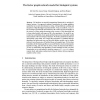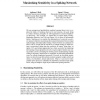970 search results - page 115 / 194 » On the relation between multi-instance learning and semi-sup... |
108
click to vote
TNN
2011
14 years 4 months ago
2011
Domain adaptation solves a learning problem in a target domain by utilizing the training data in a different but related source domain. Intuitively, discovering a good feature rep...
SOFTWARE
2002
14 years 9 months ago
2002
We consider the problem of characterisation of sequences of heterogeneous symbolic data that arise from a common underlying temporal pattern. The data, which are subject to impreci...
RECOMB
2005
Springer
15 years 10 months ago
2005
Springer
Abstract. We introduce an extended computational framework for studying biological systems. Our approach combines formalization of existing qualitative models that are in wide but ...
103
click to vote
NIPS
2004
14 years 11 months ago
2004
We use unsupervised probabilistic machine learning ideas to try to explain the kinds of learning observed in real neurons, the goal being to connect abstract principles of self-or...
JMLR
2008
14 years 10 months ago
2008
In supervised learning, a training set consisting of labeled instances is used by a learning algorithm for generating a model (classifier) that is subsequently employed for decidi...


